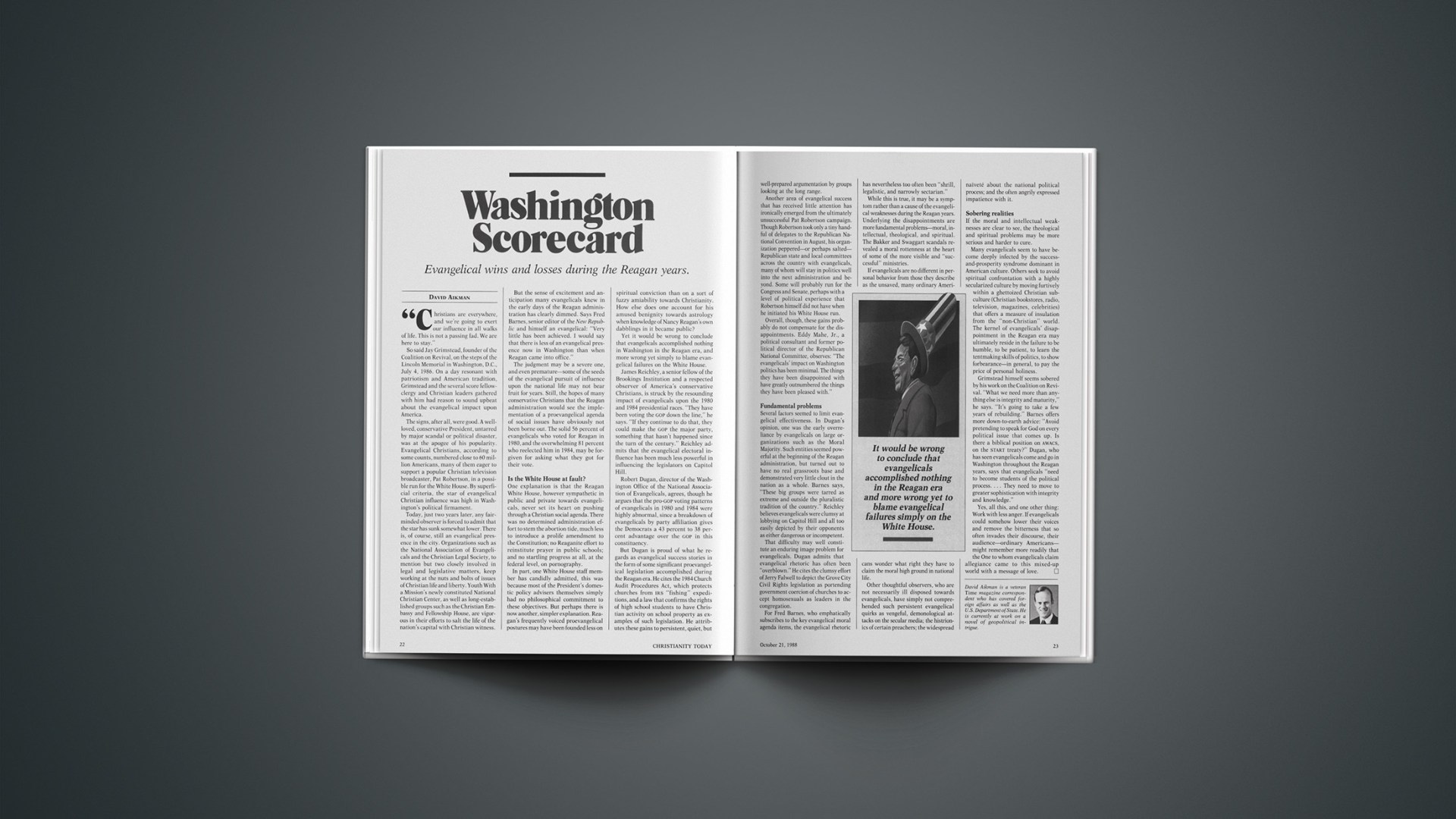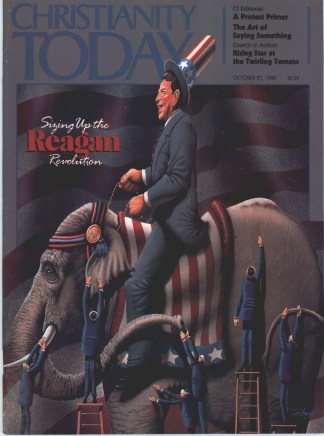Evangelical wins and losses during the Reagan years.
“Christians are everywhere, and we´re going to exert our influence in all walks of life. This is not a passing fad. We are here to stay.”
So said Jay Grimstead, founder of the Coalition on Revival, on the steps of the Lincoln Memorial in Washington, D.C., July 4, 1986. On a day resonant with patriotism and American tradition, Grimstead and the several score fellow-clergy and Christian leaders gathered with him had reason to sound upbeat about the evangelical impact upon America.
The signs, after all, were good. A well-loved, conservative President, untarred by major scandal or political disaster, was at the apogee of his popularity. Evangelical Christians, according to some counts, numbered close to 60 million Americans, many of them eager to support a popular Christian television broadcaster, Pat Robertson, in a possible run for the White House. By superficial criteria, the star of evangelical Christian influence was high in Washington’s political firmament.
Today, just two years later, any fair-minded observer is forced to admit that the star has sunk somewhat lower. There is, of course, still an evangelical presence in the city. Organizations such as the National Association of Evangelicals and the Christian Legal Society, to mention but two closely involved in legal and legislative matters, keep working at the nuts and bolts of issues of Christian life and liberty. Youth With a Mission’s newly constituted National Christian Center, as well as long-established groups such as the Christian Embassy and Fellowship House, are vigorous in their efforts to salt the life of the nation’s capital with Christian witness.
But the sense of excitement and anticipation many evangelicals knew in the early days of the Reagan administration has clearly dimmed. Says Fred Barnes, senior editor of the New Republic and himself an evangelical: “Very little has been achieved. I would say that there is less of an evangelical presence now in Washington than when Reagan came into office.”
The judgment may be a severe one, and even premature—some of the seeds of the evangelical pursuit of influence upon the national life may not bear fruit for years. Still, the hopes of many conservative Christians that the Reagan administration would see the implementation of a proevangelical agenda of social issues have obviously not been borne out. The solid 56 percent of evangelicals who voted for Reagan in 1980, and the overwhelming 81 percent who reelected him in 1984, may be forgiven for asking what they got for their vote.
Is The White House At Fault?
One explanation is that the Reagan White House, however sympathetic in public and private towards evangelicals, never set its heart on pushing through a Christian social agenda. There was no determined administration effort to stem the abortion tide, much less to introduce a prolife amendment to the Constitution; no Reaganite effort to reinstitute prayer in public schools; and no startling progress at all, at the federal level, on pornography.
In part, one White House staff member has candidly admitted, this was because most of the President’s domestic policy advisers themselves simply had no philosophical commitment to these objectives. But perhaps there is now another, simpler explanation. Reagan’s frequently voiced proevangelical postures may have been founded less on spiritual conviction than on a sort of fuzzy amiability towards Christianity. How else does one account for his amused benignity towards astrology when knowledge of Nancy Reagan’s own dabblings in it became public?
Yet it would be wrong to conclude that evangelicals accomplished nothing in Washington in the Reagan era, and more wrong yet simply to blame evangelical failures on the White House.
James Reichley, a senior fellow of the Brookings Institution and a respected observer of America’s conservative Christians, is struck by the resounding impact of evangelicals upon the 1980 and 1984 presidential races. “They have been voting the GOP down the line,” he says. “If they continue to do that, they could make the GOP the major party, something that hasn’t happened since the turn of the century.” Reichley admits that the evangelical electoral influence has been much less powerful in influencing the legislators on Capitol Hill.
Robert Dugan, director of the Washington Office of the National Association of Evangelicals, agrees, though he argues that the pro-GOP voting patterns of evangelicals in 1980 and 1984 were highly abnormal, since a breakdown of evangelicals by party affiliation gives the Democrats a 43 percent to 38 percent advantage over the GOP in this constituency.
But Dugan is proud of what he regards as evangelical success stories in the form of some significant proevangelical legislation accomplished during the Reagan era. He cites the 1984 Church Audit Procedures Act, which protects churches from IRS “fishing” expeditions, and a law that confirms the rights of high school students to have Christian activity on school property as examples of such legislation. He attributes these gains to persistent, quiet, but well-prepared argumentation by groups looking at the long range.
Another area of evangelical success that has received little attention has ironically emerged from the ultimately unsuccessful Pat Robertson campaign. Though Robertson took only a tiny handful of delegates to the Republican National Convention in August, his organization peppered—or perhaps salted—Republican state and local committees across the country with evangelicals, many of whom will stay in politics well into the next administration and beyond. Some will probably run for the Congress and Senate, perhaps with a level of political experience that Robertson himself did not have when he initiated his White House run.
Overall, though, these gains probably do not compensate for the disappointments. Eddy Mahe, Jr., a political consultant and former political director of the Republican National Committee, observes: “The evangelicals’ impact on Washington politics has been minimal. The things they have been disappointed with have greatly outnumbered the things they have been pleased with.”
Fundamental Problems
Several factors seemed to limit evangelical effectiveness. In Dugan’s opinion, one was the early overreliance by evangelicals on large organizations such as the Moral Majority. Such entities seemed powerful at the beginning of the Reagan administration, but turned out to have no real grassroots base and demonstrated very little clout in the nation as a whole. Barnes says, “These big groups were tarred as extreme and outside the pluralistic tradition of the country.” Reichley believes evangelicals were clumsy at lobbying on Capitol Hill and all too easily depicted by their opponents as either dangerous or incompetent.
That difficulty may well constitute an enduring image problem for evangelicals. Dugan admits that evangelical rhetoric has often been “overblown.” He cites the clumsy effort of Jerry Falwell to depict the Grove City Civil Rights legislation as portending government coercion of churches to accept homosexuals as leaders in the congregation.
For Fred Barnes, who emphatically subscribes to the key evangelical moral agenda items, the evangelical rhetoric has nevertheless too often been “shrill, legalistic, and narrowly sectarian.”
While this is true, it may be a symptom rather than a cause of the evangelical weaknesses during the Reagan years. Underlying the disappointments are more fundamental problems—moral, intellectual, theological, and spiritual. The Bakker and Swaggart scandals revealed a moral rottenness at the heart of some of the more visible and “successful” ministries.
If evangelicals are no different in personal behavior from those they describe as the unsaved, many ordinary Americans wonder what right they have to claim the moral high ground in national life.
Other thoughtful observers, who are not necessarily ill disposed towards evangelicals, have simply not comprehended such persistent evangelical quirks as vengeful, demonological attacks on the secular media; the histrionics of certain preachers; the widespread naïveté about the national political process; and the often angrily expressed impatience with it.
Sobering Realities
If the moral and intellectual weaknesses are clear to see, the theological and spiritual problems may be more serious and harder to cure.
Many evangelicals seem to have become deeply infected by the success-and-prosperity syndrome dominant in American culture. Others seek to avoid spiritual confrontation with a highly secularized culture by moving furtively within a ghettoized Christian subculture (Christian bookstores, radio, television, magazines, celebrities) that offers a measure of insulation from the “non-Christian” world. The kernel of evangelicals’ disappointment in the Reagan era may ultimately reside in the failure to be humble, to be patient, to learn the tentmaking skills of politics, to show forbearance—in general, to pay the price of personal holiness.
Grimstead himself seems sobered by his work on the Coalition on Revival. “What we need more than anything else is integrity and maturity,” he says. “It’s going to take a few years of rebuilding.” Barnes offers more down-to-earth advice: “Avoid pretending to speak for God on every political issue that comes up. Is there a biblical position on AWACS, on the START treaty?” Dugan, who has seen evangelicals come and go in Washington throughout the Reagan years, says that evangelicals “need to become students of the political process.… They need to move to greater sophistication with integrity and knowledge.”
Yes, all this, and one other thing: Work with less anger. If evangelicals could somehow lower their voices and remove the bitterness that so often invades their discourse, their audience—ordinary Americans—might remember more readily that the One to whom evangelicals claim allegiance came to this mixed-up world with a message of love.
David Aikman is a veteran Time magazine correspondent who has covered foreign affairs as well as the U.S. Department of State. He is currently at work on a novel of geopolitical intrigue.










